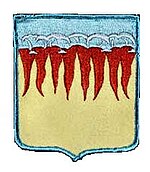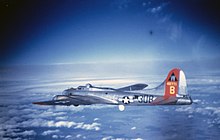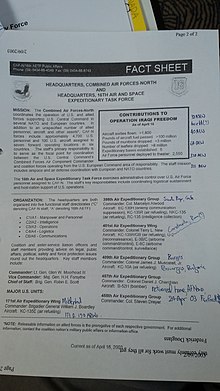| This article needs additional citations for verification. Please help improve this article by adding citations to reliable sources. Unsourced material may be challenged and removed. Find sources: "398th Air Expeditionary Group" – news · newspapers · books · scholar · JSTOR (December 2012) (Learn how and when to remove this message) |
| 398th Air Expeditionary Group | |
|---|---|
 Gregory S. Martin, Commander, United States Air Forces in Europe is given a tour of a NKC-135 during a visit to the 398th Air Expeditionary Group during Operation Iraqi Freedom Gregory S. Martin, Commander, United States Air Forces in Europe is given a tour of a NKC-135 during a visit to the 398th Air Expeditionary Group during Operation Iraqi Freedom | |
| Active | 1943–1945; 1992-1995; 2003; 2004; 2006; 2008 |
| Country | |
| Branch | |
| Role | Expeditionary operations |
| Engagements | |
| Insignia | |
| Patch with unofficial 398th Bombardment Group emblem |  |
| World War II tail marking | Triangle W |
The 398th Air Expeditionary Group is a provisional United States Air Force unit assigned to the United States Air Forces in Europe. The 398 AEG may be activated or inactivated at any time.
During World War II, its predecessor unit, the 398th Bombardment Group (Heavy) was an Eighth Air Force B-17 Flying Fortress unit in England, stationed at RAF Nuthampstead. The group flew 195 combat missions, the last being on 25 April 1945.
History
World War II

The group was constituted as the 398th Bombardment Group (Heavy) on 15 February 1943, and equipped with the B-17 Flying Fortress. It was activated 1 March 1943 at Ephrata Army Air Base, Wash., with the 600th, 601st, 602d, and 603d Bombardment Squadrons. The Group assembled at Blythe Army Airfield, California, and then moved to Geiger Field, Washington, on 20 April 1943 to complete training. On 20 June 1943 moved to Rapid City Army Air Base, South Dakota, to take up Replacement Training Unit duties. Trained 326 B-17 crews from August to December 1943 but at the beginning of the New Year reverted to training for combat. Ground echelon began movement overseas on 4 April 1944. The unit moved to Camp Myles Standish, Massachusetts, on 7–12 April 1944. Personnel embarked on USS Wakefield. Sailed to Boston on 13 April, and arrived in Liverpool on 21 April 1944.
Moved to England in April 1944 and assigned to Eighth AF. The 398th BG entered combat in May 1944, and until V-E Day operated primarily against strategic objectives in Germany, attacking targets such as factories in Berlin, warehouses in Munich, marshalling yards in Saarbrücken, shipping facilities in Kiel, oil refineries in Merseburg, and aircraft plants in Münster.
The group temporarily suspended strategic missions to attack coastal defenses and enemy troops on the Cotentin Peninsula during the Invasion of Normandy in June 1944. The group struck gun positions near Eindhoven in support of the air attack on Holland in September 1944, and raided power stations, railroads, and bridges during the Battle of the Bulge, December 1944 – January 1945. The group flew missions attacking airfields to aid the Allied assault across the Rhine in March 1945.
The 398th flew its last combat mission, attacking an airfield in Plzeň, Czechoslovakia, on 25 April 1945. After V-E Day the group transported liberated prisoners from Germany to France.
From Nuthampstead, the 398th Bomb Group flew 195 combat missions. Redeployed USA in May/June 1945. The aircraft left on 21–27 May 1945. The Ground unit went to Greenock on 22 June 1945 and sailed on Queen Elizabeth arriving in New York on 29 June 1945. After 30 days R & R some personnel assembled at Drew Field, Florida, where the Group was inactivated on 1 September 1945.
Post Cold War

The 398th BG was redesignated as the 398th Operations Group and activated 1 June 1992. Reactivated in 1992 as 398th Operations Group. Assigned first to 340th Air Refueling Wing, later to 97th Air Mobility Wing as a KC-135 air refueling group. From 1 June 1992 – 31 March 1995 the 93d Air Refueling Squadron was part of the group. The 398th OG was inactivated on 31 March 1995.
During Operation Iraqi Freedom the title 398th Air Expeditionary Group was given to a collection of units and personnel operating from Naval Support Activity Souda Bay, Greece. Colonel Marcelyn A. Atwood commanded the group.
Later in 2003, the unit participated in Operation Shining Express in Liberia, a rescue operation directed by the United States European Command to evacuate civilians from parts of Liberia affected by the Second Liberian Civil War. Among the groups contributions was delivering a United States Marine Corps security forces team.
From 23 March and 10 April 2008, the 398th with the 712th Expeditionary Air Refueling Squadron was deployed to the Budapest International Airport, assigned to the 323d Air Expeditionary Wing. It provided air refueling missions to fighters in support of Operation Noble Endeavor during the 2008 Bucharest summit.
Lineage
- Constituted as the 398th Bombardment Group (Heavy) on 15 February 1943
- Activated on 1 March 1943
- Redesignated 398th Bombardment Group, Heavy c. 20 August 1943
- Inactivated on 1 September 1945
- Redesignated 398th Operations Group in 1992
- Activated on 1 June 1992
- Inactivated on 31 March 1995
- Redesignated 398th Expeditionary Air Refueling Group and converted to provisional status on 5 February 2001
- Redesignated 398th Air Expeditionary Group on 18 March 2003
- Activated in c. 13 July 2003
- Inactivated on 8 October 2003
- Activated in 2004
- Inactivated on 17 June 2004
- Activated on 25 March 2006
- Inactivated on 8 April 2006
- Activated on 14 March 2008
- Inactivated on 30 April 2008
Air Expeditionary Service with Joint Task Force Liberia 2003; 2008. During this period the group flew the HH-60 helicopter, and Marine units attached to the group in 2003 operated the AV-8B Harrier.
Assignments

- II Bomber Command, 1 March 1943 – 4 April 1944
- 1st Combat Bombardment Wing, 22 April 1944 – 22 June 1945
- III Bomber Command, 3 July - 1 September 1945
- 340th Air Refueling Wing, 1 June - 1 October 1992
- 97th Air Mobility Wing, 1 October 1992 – 31 March 1995
- United States Air Forces in Europe to activate or inactivate at any time after 5 February 2001
- 16th Air and Space Expeditionary Task Force, circa 16 April 2003
- 3d Expeditionary Air and Space Task Force, c. 13 July - 8 October 2003
- Attached to Third Air Force, 2004 - 17 June 2004
- Attached to Air Command Europe, 25 March - 8 April 2006
- 323d Air Expeditionary Wing, 14 March - 30 April 2008
Components
- 56th Expeditionary Rescue Squadron, c. 13 July - 8 October 2003
- 93d Air Refueling Squadron, 1 June 1992 - 31 March 1995
- 330th Flying Training Squadron, 1 June 1992 – 20 January 1994
- 600th Bombardment Squadron, 1 March 1943 - 1 September 1945
- 601st Bombardment Squadron, 1 March 1943 - 1 September 1945
- 602d Bombardment Squadron, 1 March 1943 - 1 September 1945
- 603d Bombardment Squadron, 1 March 1943 - 1 September 1945
- 712th Expeditionary Air Refueling Squadron, 18 March – 30 April 2008
- 772d Expeditionary Air Base Squadron, c. 13 July - 8 October 2003
- 786th Expeditionary Security Forces Squadron, c. 13 July - 8 October 2003
Stations
|
|
References
Notes
- Aircraft is Lockheed/Vega B-17G-80-VE Flying Fortress serial 44-8771. This B-17 was assigned to the 398th BG on 2 March 1945. It flew 6 combat missions before being flown back to the United States on 23 May.
Citations
- ^ Watkins pp. 84-85
- See Maurer, Combat Units, p. 284 (no approved emblem)
- "CAAB - USAFE commander, CCM visit deployed troops - 1/4/03". Archived from the original on 1 December 2008. Retrieved 10 February 2008.
- Eric Petosky (2 April 2008). "Tankers deploy to Hungary, Bulgaria for Operation Noble Endeavor". usafe.af.mil.
- ^ Maurer, Combat Squadrons' , p. 284
- Wilson
- Station number in Anderson
- World War II stations in Maurer, Combat Units, p. 284
Bibliography
![]() This article incorporates public domain material from the Air Force Historical Research Agency
This article incorporates public domain material from the Air Force Historical Research Agency
- Anderson, Capt. Barry (1985). Army Air Forces Stations: A Guide to the Stations Where U.S. Army Air Forces Personnel Served in the United Kingdom During World War II (PDF). Maxwell AFB, AL: Research Division, USAF Historical Research Center. Archived from the original (PDF) on 4 March 2016. Retrieved 7 July 2012.
- Freeman, Roger A. (1991) The Mighty Eighth The Colour Record. Cassell & Co. ISBN 0-304-35708-1
- Maurer, Maurer, ed. (1983) . Air Force Combat Units of World War II (PDF) (reprint ed.). Washington, DC: Office of Air Force History. ISBN 0-912799-02-1. LCCN 61060979.
- Maurer, Maurer, ed. (1982) . Combat Squadrons of the Air Force, World War II (PDF) (reprint ed.). Washington, DC: Office of Air Force History. ISBN 0-405-12194-6. LCCN 70605402. OCLC 72556.
- Watkins, Robert (2008). Battle Colors: Insignia and Markings of the Eighth Air Force in World War II. Vol. I (VIII) Bomber Command. Atglen, PA: Shiffer Publishing Ltd. ISBN 978-0-7643-1987-7.
- Wilson, Art (2008). Runways in the Sand. Blythe, California: Art Wilson. p. 108. ISBN 978-0-615-21889-2. OCLC 316309702. LCC D769.85.C21 B598 2008
External links
- "USAFE commander, CCM visit deployed troops", Maj. Scott Vadnais
- "Rain presents a challenge for Air Force crews in Liberia", Marni McEntee, Stars and Stripes European edition, 24 July 2003
- "USAFE forces deliver U.S. Marines to Liberia, evacuate 23 people", Capt. Kristi Beckman, USAFE News
| Airfields |  | ||||||||||||||
|---|---|---|---|---|---|---|---|---|---|---|---|---|---|---|---|
| Units |
| ||||||||||||||
| |||||||||||||||